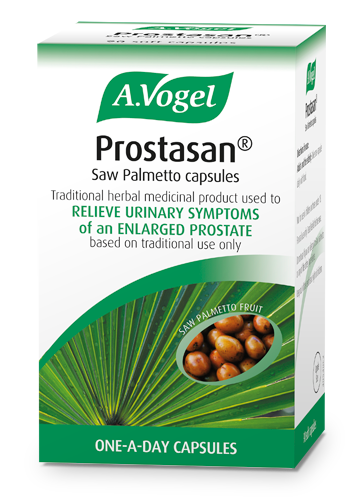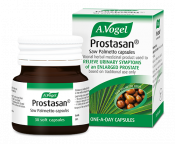An introduction to enlarged prostate causes
BPH, or Benign Prostatic Hyperplasia, refers to an increase in the size of the prostate. As it swells, the prostate can begin to press on the bladder and urethra, causing a number of problems with bladder function and urination.
The exact cause of prostate enlargement is not entirely understood, but we do know that there are a number of contributing factors. Age is an important one, as well as hormones, diet and stress levels.
Age
More of a risk factor than a cause, BPH is often thought to be a normal part of the ageing process. In fact, 50% of men over 50 will suffer from the condition, while 90% of men over 80 will.
Hormones
Hormones play a key role in the development of BPH. Testosterone is the most famous male sex hormone, and it is responsible for things like sexual development, libido, muscle mass development and the deeper male voice.
However, when too much of this testosterone gets converted into dihydrotestosterone (DHT), problems can begin to occur. In adolescents, this hormone stimulates the normal growth of sexual organs, including the prostate, making it a useful hormone in the correct amounts. If too much DHT is produced, we begin to see problems like acne and aggression developing.
In older men, however, DHT can cause the continued growth of the prostate, which, if left unchecked, can lead to prostate enlargement and other prostate problems.
Diet
Diet also plays an important, but often poorly understood, role in the development of BPH.
We know that prostate enlargement is most common in Western countries like the UK and US, while Asian countries such as Japan and Singapore see the lowest rates. One of the biggest differences between these countries is traditional diet.
The typical Western diet is high in things like refined sugar, simple carbohydrates, unhealthy fats, meat and dairy. Eastern and Asian diets are typically richer in vegetables, complex carbohydrates and healthy soya-based proteins.
We know that daily consumption of red meat increases the chances of developing an enlarged prostate by 38%, while dairy is a known inflammatory that not only contributes to hayfever and joint pain, but also causes inflammation of the prostate, worsening the enlargement process.
Soya, on the other hand, is thought to reduce the chances of developing an enlarged prostate, while eating four or more servings of vegetables a day can decrease the risk of developing BPH by 32%.
Zinc is also a vital nutrient for the prostate, and this can be found in nuts, seeds and pulses, which are often missing from typical Western diets.
In addition, a poor diet that lacks fibre can often cause constipation, which we know can affect the prostate. Your prostate sits very close to your bowel, so if toxins are sitting in your bowel for too long they can begin to leak into the surrounding tissues, right into your prostate. This can cause inflammation and pain. As well as the toxins from your bowel, the increased pressure created by a constipated bowel can begin to press on both the prostate and the bladder, worsening your symptoms.
For more advice on the best diet for your prostate, visit our article on eating for a healthy prostate.
Stress
Stress is another key factor in BPH that is often overlooked. For people who already have an enlarged prostate, stress can cause inflammation which makes the problem worse. It can also cause tensing of the muscles, which can cause further restriction to the function of the bladder.
Stress can also quickly strip nutrients form the body, and one of the nutrients it is highly likely to deplete is zinc – which we now know is vital for a healthy prostate.
Another effect of stress is the release of testosterone and DHT, which, as we know, can contribute to the development of BPH. One-off bouts of stress won’t cause the prostate to suddenly balloon, but prolonged, repeated incidents of stress will cause a more steady release of these hormones.
This prolonged stress is particularly common in people with high-pressure jobs, people who commute or people who just struggle to switch off and relax.
What can you do?
While you can’t do anything about your age, you can make a number of changes to your diet and lifestyle to promote your prostate health.
Firstly, ditch the meat and dairy, and add in lots of fruit, vegetables, wholegrains, pulses, nuts and seeds. You should also try to include some soya products such as tempeh, miso and tofu.
This might seem difficult if you are used to a typically meat and dairy-heavy diet, but there are lots of tasty meals you can make from plant-based ingredients, such as this three bean curry, tofu and vegetable satay, or mushroom risotto.
Secondly, try to reduce your stress levels by tackling the root cause of your stress, practising mindfulness and taking a stress remedy. For more tips, follow our advice for managing stress.
 To supplement your new healthy diet and lifestyle, try taking our Saw Palmetto capsules. These are licensed for the relief of BPH symptoms and are made from the rich, oily extract of saw palmetto berries. These capsules have fantastic reviews and aren’t associated with the unpleasant side effects of conventional BPH treatment.
To supplement your new healthy diet and lifestyle, try taking our Saw Palmetto capsules. These are licensed for the relief of BPH symptoms and are made from the rich, oily extract of saw palmetto berries. These capsules have fantastic reviews and aren’t associated with the unpleasant side effects of conventional BPH treatment.
For more advice on treating BPH, head to our treatment pages, where you’ll find information on diet, natural remedies ad conventional medicine.








